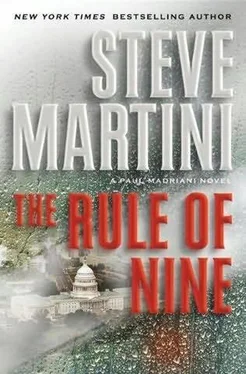For the Japanese bombardier who dropped it, it was a lucky shot. Thorn couldn’t afford to rely on luck. He would compensate for this with a combination of laser-guidance systems and advanced control surfaces that would dramatically increase the glide ratio of the ordnance he was using. Like the Japanese, he would marry old technology to new.
The answer was the Paveway, a series of laser-guided add-ons made by Texas Instruments, Raytheon, and a number of other corporations starting in the 1960s. The various versions included large tail-fin assemblies and nose-cone attachments with laser seekers. These could be attached to any dumb iron gravity bomb, transforming it into a precision-guided system with a glide ratio in some instances exceeding fifteen nautical miles.
The defensive perimeter around the target was twice this range, thirty nautical miles. But the government had already compromised this protective zone by their demonstrated and repeated indecision regarding the rules of engagement. Thorn was well aware of these incidents, one of which had involved a state governor whose pilot drifted into the protection zone through ignorance.
It’s what always happened when the airspace over a target was too often inhabited by people of power and influence. It was one thing to shoot down a planeload of three or four hundred taxpayers. It was another to shoot down one of the privileged political class flying in their ego-containered government jets. The pattern had been set to hold their fire and try to escort the violator to the nearest airport where their ass could be gently hauled off in a limousine of state to the nearest five-star hotel.
To Thorn, this was invariably the case. The defensive systems and the people operating them seldom failed. But the pampered powerful whose minds were focused on their own wealth, comfort, and continued power could sabotage anything, and almost always did.
Joselyn, Herman, and I checked into the Hotel Melia in downtown Ponce. The Melia is in the historic area, about ten blocks from the cathedral and the Hotel Belgica. Joselyn checked into her room while Herman and I took the car and headed toward the Belgica to see what we could find out.
It took a few minutes to make our way through town, Herman behind the wheel with me navigating. Ponce is a larger and more congested area than it looked like on the map pictured on Joselyn’s computer.
When we finally found the street that went in front of the Belgica, traffic was one-way, and by the time we got in front of the hotel we were almost past it before we realized. There were cars parked on both sides of the street, with nowhere for us to stop. Then we got lucky.
A car pulled out of a spot at the curb across the street about a half block down from the entrance to the hotel. Herman blocked traffic, with horns blaring behind us, to let the guy out, then pulled forward, backed in, and turned off the engine.
“You got those photographs of Thorn?” he says.
I reach over to the backseat and find the three photos in my briefcase. “I thought we agreed we weren’t going to use these?”
“Sit tight.” With that, Herman takes the photographs from my hand and is out of the car. He slams the door, leaving me in the passenger seat as he strolls down the sidewalk in the shade until he is just opposite the entrance to the hotel. I watch as he slips between traffic, crosses the street, and disappears through the entrance under the awning.
We had already decided that we would use the photographs of Thorn to question the clerk at the front desk only as a last resort. Innkeepers are generally protective of their guests. Any word that someone was asking questions about him and Thorn would vanish like a puff of smoke. And any hopes of finding a trail that might lead to Liquida would vanish with him. Of course, all of this assumes that Thorn is even here.
While I’m waiting in the car I feel the cell phone on my hip and I’m wishing I could call Sarah. I could, but I don’t. I haven’t spoken to her in several days, and by agreement we haven’t called each other. It’s a problem. I have had to delete all contact information on her from my phone in case either I or the phone falls into Liquida’s hands. There are simply too many records maintained on cell phones and computers to feel safe. Even without information in your contact lists, a call made or received showing an area code can leave an indelible record that can be traced. I am glad that Harry is with her.
Herman is inside the Belgica for a while. It’s starting to warm up in the car.
Just as I reach for the door handle I see Herman step out from the hotel’s entrance under the awning. He has some literature in his hand and a smile on his face. He crosses the street, sashaying between the cars, making his way back, and opens the driver’s-side door. Then he settles in behind the wheel.
“You look satisfied.”
“It’s hot in here.”
“I know.”
He puts in the key and turns on the engine and the air conditioner. Then he closes the door.
“What did you find out?”
“We got lucky,” says Herman. “Our man’s there.”
“Did you see him?”
“No, but Joselyn said Thorn had an Australian accent. The kid behind the registration desk was very helpful. I told him I was lookin’ for a man with an Australian accent who was supposed to be stayin’ at the hotel. I slipped him a couple of twenties, showed him my PI credentials, and told him I was serving process in a divorce case.”
“And?”
“He says, ‘You mean Señor Johnston?’” Herman looks at me and smiles. “So much for hotel privacy. I showed him the close-up photo of Thorn and the kid says, ‘Yeah, he checked in two days ago.’”
“How do you know he won’t tell Thorn?”
“Best reason in the world, economic stimulus,” says Herman. “I told him the two twenties I gave him had brothers. If he kept his mouth shut until after I served Johnston, I’d make it an even hundred. I stuffed another twenty in his pocket on the way out just to keep him happy. So you know what that means?”
“Yeah. I owe you sixty bucks,” I tell him. “And if you pay him the other forty it’s coming out of your own pocket.”
“Don’t worry. You don’t have to pay me right now,” he says. “I’ll put it on my next billing statement.”
“Is Thorn in the hotel now?” I ask.
“No. He leaves his key at the desk when he goes out and picks it up when he comes back. The clerk checked. The key was in one of the slots behind the counter, room 219,” says Herman. “Guess who’s in 221?” He opens his hand and flashes me the key. “Looks like you and I won’t be snorin’ in the same room tonight. And by the way, you can tell Joselyn that, for the record, you do snore.”
“Did the desk clerk have any idea when Thorn might be back?”
“No, but he said Señor Johnston seems to be on some kind of a schedule and appears to be working very hard.”
“How’s that?”
“According to the clerk, he leaves every morning between six thirty and seven and doesn’t get back until after dark. Kid says he doesn’t know where he goes or what he does. Johnston keeps to himself. But he’s gone all day. Tell you what, I’ll drop you back at the Melia, then I’ll have to bring the car over here. I’ll need it in case Thorn shows up and leaves again, so I can follow him. My room’s right next door to his, so I should hear him when he comes in.”
“Do you want me to call Thorpe again, tell him we think we found Thorn?” I ask.
“We got this far, why don’t we wait and see what’s goin’ on? Besides, he didn’t seem that enthusiastic the last time.”
“He was busy,” I tell him.
“He’s always busy,” says Herman.
Читать дальше












